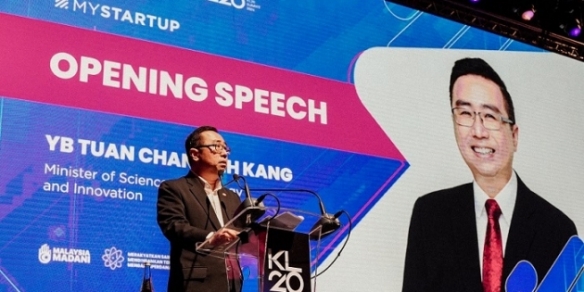Cradle out to plug deals outflow with seed venture initiative
By Goh Thean Eu June 9, 2015
- Less chance of startups moving out if they can get Series A funding locally
- Number of VC deals doubled in Q1 2015 to 13, Singapore had 39 though

SOME may see the recent launch of Cradle Seed Ventures Pte Ltd as an initiative to encourage public-private partnership on the domestic startup funding front, but the move has a much bigger agenda: To prevent, or at least to minimise, the number of good deals flowing out of Malaysia.
It is also aimed at reducing the number of promising startups from moving their base outside the country, according to Cradle Fund Sdn Bhd chief executive officer Nazrin Hassan (pic above).
“The idea is also to give them a local option, because prior to this, you couldn’t blame them for going to Singapore. There were no local options.
“If we raise the ‘Series A’ bar … with our co-investment initiatives, among others, we would be able to retain more of the deals here in Malaysia,” he said after the launch of Cradle Seed Ventures last Thursday (June 4).
According to Nazrin, venture capitalists (VCs) are fleeing the Series A stage. “Everybody wants to do Series B onwards. In the end, somebody has got to play that strategic Series A role.”
Cradle Seed Ventures, a wholly-owned subsidiary of Cradle Fund – itself a non-profit under Malaysia’s Ministry of Finance – will manage the Cradle Seed Venture Fund 1 (CSVF1).
The fund currently has RM40 million (US$11 million) in its coffers. The plan is to grow the fund size to RM100 million (US$27 million) over the next 12 months, primarily with injections from the private sector.
CSVF1 will fund from RM1 million to RM3 million into promising and scalable technology startups at the pre-Series A, Series A and growth stages, for a minority equity stake.
Nazrin said that being able to provide promising startups Series A funding would increase the chances of these startups retaining their base in Malaysia, and not move elsewhere.
“If we can provide them with Series A funding, the chances of getting them Series B funding or some other form of partnerships will be higher.
“If we lose them at Series A, they’re gone. You lose the deal completely.
“If they raise their Series A in Malaysia, they are likely to continue their other rounds of funding in the country. Even if the startups go to Singapore for future fund-raising, they [their base] would still remain here,” he added.
Over the years, Malaysia has churned out a number of promising startups, including the popular GrabTaxi, which is still known as MyTeksi in its home base.
In its early days, MyTeksi was given a boost when Cradle awarded it a development grant of RM150,000 (about US$41,000 at current rates) under its CIP150 (Cradle Investment Programme).
Since then however, the taxi-booking app startup has raised a series of funds to the tune of about US$340 million in total, mostly out of Singapore, and has moved its headquarters there – so much so that many blogs dedicated to the startup space refer to it as a Singaporean company.
In April, GrabTaxi announced it is allocating US$100 million over the next two to three years to fund an international research and development centre in Singapore too.
Many Singapore-based funds are in one-to-one matching deals with various Singapore Government agencies and initiatives, which make incorporation in the city-state a requirement.
Zero-sum game, e-commerce push
 According to Cradle Seed Ventures chief executive officer Aziz Hussein (pic), the number of VC deals more than doubled in Malaysia to 13 in the first quarter this year, compared with the five deals in the fourth quarter (Q4) of 2014.
According to Cradle Seed Ventures chief executive officer Aziz Hussein (pic), the number of VC deals more than doubled in Malaysia to 13 in the first quarter this year, compared with the five deals in the fourth quarter (Q4) of 2014.
While the jump in deals seems like an encouraging sign, he stressed that there’s room for growth.
“In Singapore, there were 39 VC deals in the first quarter this year (Q4 2014: 40 deals). So we are still behind in terms of deal flows,” said Aziz. “We hope to improve the deal flow in Malaysia with this initiative.”
Cradle Seed Ventures will focus on Internet and mobile technology businesses, software and enterprise solutions, as well as hardware and engineering.
It is currently looking at more than 30 deals, according to Aziz, of which more than 90% are related to e-commerce – whether they are online marketplaces or technology providers for such ventures.
This is because of the huge growth potential. He said that the e-commerce space in South-East Asia is expected to grow by approximately 25% annually between 2013 and 2017.
That potential has seen a mushrooming of e-commerce ventures in Malaysia. In a media briefing last month to launch its GemFive online shopping portal, GuoLine eMarketing Sdn Bhd chief executive officer Moey Tan referred to findings by BCG Analysis in September 2014 that supported the room for growth belief.
Tan said that according to BCG Analysis, the online retail spend for most countries in South-East Asia was relatively low at less than 5% of total retail spend.
In contrast, China’s online retail spend was almost 10% of total retail spend, while the Netherlands has more than 15% and the United Kingdom has over 20%.
Related Stories:
18 months later, Cradle Seed Ventures finally launches
Cradle-GGV funding pact to also help plug entrepreneur brain drain
Sync, MauKerja raise RM1mil each from Cradle co-investment pact
Is Malaysia ‘losing out’ to Singapore?
Tech Vision: The emerging world of bricks and clicks
For more technology news and the latest updates, follow us on Twitter, LinkedIn or Like us on Facebook.


